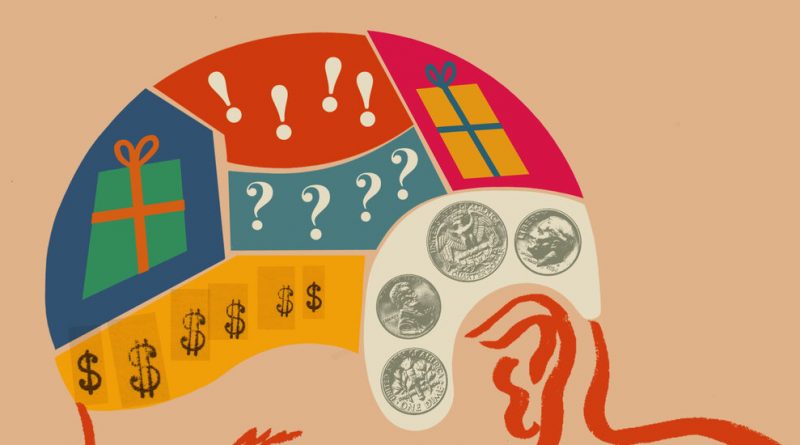Opinion | How to Use Science to Give Good Gifts
[ad_1]
On Christmas morning, a husband quietly apologizes to his wife that his gifts this year are humble — money is tight. She bravely affirms that she loves the pajamas and the sweater. Later, as the children play with their new toys, the husband reveals one last gift box, in which the wife discovers a diamond necklace. She squeals with astonished delight.
This advertising trope is not just cloying. It also feeds five false beliefs people commonly hold about what makes gift recipients happy. Fortunately, psychological and marketing research not only shows that these beliefs are wrong; it also offers guidance for picking gifts people will actually like.
First, ignore price. Despite the stock saying, “It’s the thought that counts,” gift givers think that spending a lot — on diamonds, for example — shows that they care. When researchers asked people to recall a gift they gave and then to rate how much they thought recipients liked it, higher prices went with higher ratings. But when people made the same ratings for a gift they had received, price was completely unrelated to enjoyment.
Second, give gifts that are actually usable. Gift givers tend to focus on how pleasurable it would be to use the gift, but overlook how easily or often the gift will be used; a husband might imagine his wife feeling like a million bucks in her diamonds, but ignore the fact that she seldom wears formal jewelry.
Givers might favor the beautiful and dramatic because they think about gifts in the abstract: “What’s a good gift?” Recipients, in contrast, imagine themselves using it, and so focus more on utility.
That’s why people buying gift cards for others often prefer luxury brands over everyday brands, but the preference reverses when they are buying for themselves. Indeed, a study examined the prices that resold gift cards commanded on eBay, and showed that people were willing to pay around $77 for a $100 gift card to a more expensive store (for example, Bloomingdale’s), but would pay around $89 for a $100 gift card to an everyday establishment (for example, Lowe’s).
Third, (and this one is especially relevant during the pandemic) don’t worry if your gift isn’t usable immediately. Although it feels odd to you, recipients don’t mind waiting. In one experiment, researchers asked people to compare different types of gifts: one was immediately appealing, like a dozen flowers in full bloom, or, for a similar price, a gift that would be more satisfying in the long term, like two dozen buds that would bloom in a few days.
When people thought they would give the gift, they preferred the former, but others who were asked which they’d like to receive picked the latter. Another study showed a similar asymmetry for giving part of a gift. Givers didn’t like the idea of giving someone half the money to buy a high-end blender, preferring to give a medium-priced model outright. Recipients showed the opposite preference.
Fifth, give experiences, not things. That’s true even during the pandemic — remember, people don’t mind waiting. Research over the last decade shows that experiences lead to more long-lasting satisfaction than new possessions: a family vacation is a better bet than that diamond necklace. But givers are leery of experiences because they worry it’s more likely they’ll pick something the recipient doesn’t want. It’s a valid concern, but there’s an easy fix: make sure there are choices. Instead of giving a massage, give a gift certificate to a spa that offers a range of services.
To be clear, all of this research does not show that recipients mostly hate the gifts they get. But it does show that, on average, people could give better gifts. Why don’t they?
It may be that we don’t learn what makes a good gift because we seldom get valid feedback; social convention dictates that you must profess to like any present you get.
Jeff Galak, a professor of marketing at Carnegie Mellon, along with two colleagues, offers a compelling, somewhat darker alternative: Givers are actually a bit selfish. They favor dramatic, expensive, surprising gifts because they want to see the recipient’s delight. The long-term pleasure of the recipient may not be observed and therefore is discounted.
After a hard year, we may be especially eager to savor a look of shocked joy on a recipient’s face. But after all, it is the season to set aside our own desires and try our best to anticipate theirs. That may bring longer-lasting joy.
Daniel T. Willingham (@DTWillingham) is a professor of psychology at the University of Virginia and the author, most recently, of “The Reading Mind: A Cognitive Approach to Understanding How the Mind Reads.”
The Times is committed to publishing a diversity of letters to the editor. We’d like to hear what you think about this or any of our articles. Here are some tips. And here’s our email: letters@nytimes.com.
Follow The New York Times Opinion section on Facebook, Twitter (@NYTopinion) and Instagram.
